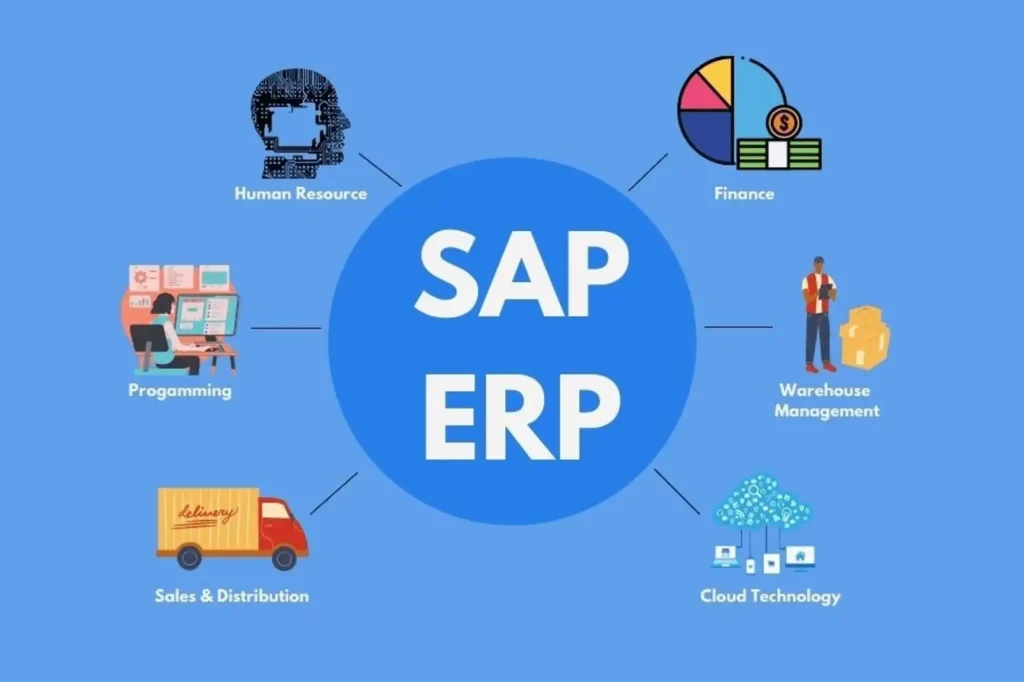Enterprises of all sizes strive to optimize their operations and stay ahead of the curve. To achieve this, many organizations turn to ERP systems. Among the leading ERP solutions, SAP ERP software stands tall, providing a comprehensive suite of tools that streamline various business processes. In this blog, we’ll explore SAP ERP, its key features, benefits, and why it has become the go-to solution for businesses worldwide.
What is SAP ERP?
SAP ERP, developed by the German software company SAP SE, is an integrated suite of business applications that enables organizations to efficiently manage their core processes in real time. With modules for different business functions, SAP ERP software acts as a central storehouse of data and facilitates seamless communication across various departments.
Key Features of SAP ERP Software:

1. Finance and Accounting Management:
SAP ERP software offers robust financial management tools that help organizations handle their accounting, financial reporting, budgeting, and cash management effectively. It provides real-time insights into financial performance, aiding decision-makers in making informed choices.
2. Human Resources Management:
The HR module of SAP ERP assists with talent acquisition, employee management, payroll, benefits administration, and performance evaluation. It ensures human capital is utilized optimally, leading to increased productivity and employee satisfaction.
3. Supply Chain Management:
This feature helps manage the end-to-end supply chain processes, including procurement, inventory management, production planning, and distribution. It enables businesses to achieve cost efficiency and deliver products to customers on time.
4. Sales and Customer Relationship Management:
SAP ERP’s CRM module allows organizations to track leads, manage customer information, and improve customer service. It helps in creating personalized experiences and building long-lasting customer relationships.
5. Manufacturing and Production Management:
With SAP ERP software, manufacturers can streamline their production processes, monitor work orders, track work in progress, and optimize resource utilization. This ensures increased production efficiency and reduced downtime.
6. Analytics and Reporting:
SAP ERP software provides powerful analytics and reporting tools, enabling data-driven decision-making. Customizable dashboards and real-time insights allow stakeholders to monitor key performance indicators (KPIs) and identify areas for improvement.
Benefits of SAP ERP:
- One of the most significant advantages of SAP ERP is its ability to integrate various business functions into a single platform. This integration leads to enhanced data visibility, better collaboration, and improved overall efficiency.
- SAP ERP offers real-time data updates, ensuring that decision-makers have access to the most current information. This empowers organizations to respond swiftly to market changes and make data-driven decisions.
- By automating repetitive tasks and streamlining processes, SAP ERP frees up employees’ time, allowing them to focus on more strategic tasks.
- SAP ERP helps organizations identify cost inefficiencies and optimize resource utilization. By centralizing data and improving process visibility, businesses can reduce operational costs and achieve significant savings.
- The CRM module of SAP ERP enables organizations to deliver personalized customer experiences. Satisfied customers are more likely to become loyal brand advocates, contributing to business growth.
- SAP ERP assists businesses in adhering to various regulatory requirements and industry standards. It helps maintain accurate records, ensures data security, and facilitates audit readiness.
Conclusion:
In conclusion, SAP ERP software is a powerful and versatile solution that enables organizations to streamline their business operations, enhance collaboration, and drive growth. With its extensive range of modules and features, SAP ERP caters to the unique needs of different industries and scales with businesses as they grow.
However, it’s essential to acknowledge that implementing SAP ERP is a complex process that requires careful planning, skilled professionals, and adequate training for the workforce. To make the most out of SAP ERP, businesses should consider partnering with experienced consultants and SAP-certified experts who can guide them through the implementation and utilization of this remarkable software.
As technology continues to evolve, SAP SE continues to enhance its ERP offerings, ensuring that businesses have access to cutting-edge solutions that will keep them at the forefront of their industries. Embracing SAP ERP is a step towards greater efficiency, improved decision-making, and sustained success in today’s dynamic business environment.




